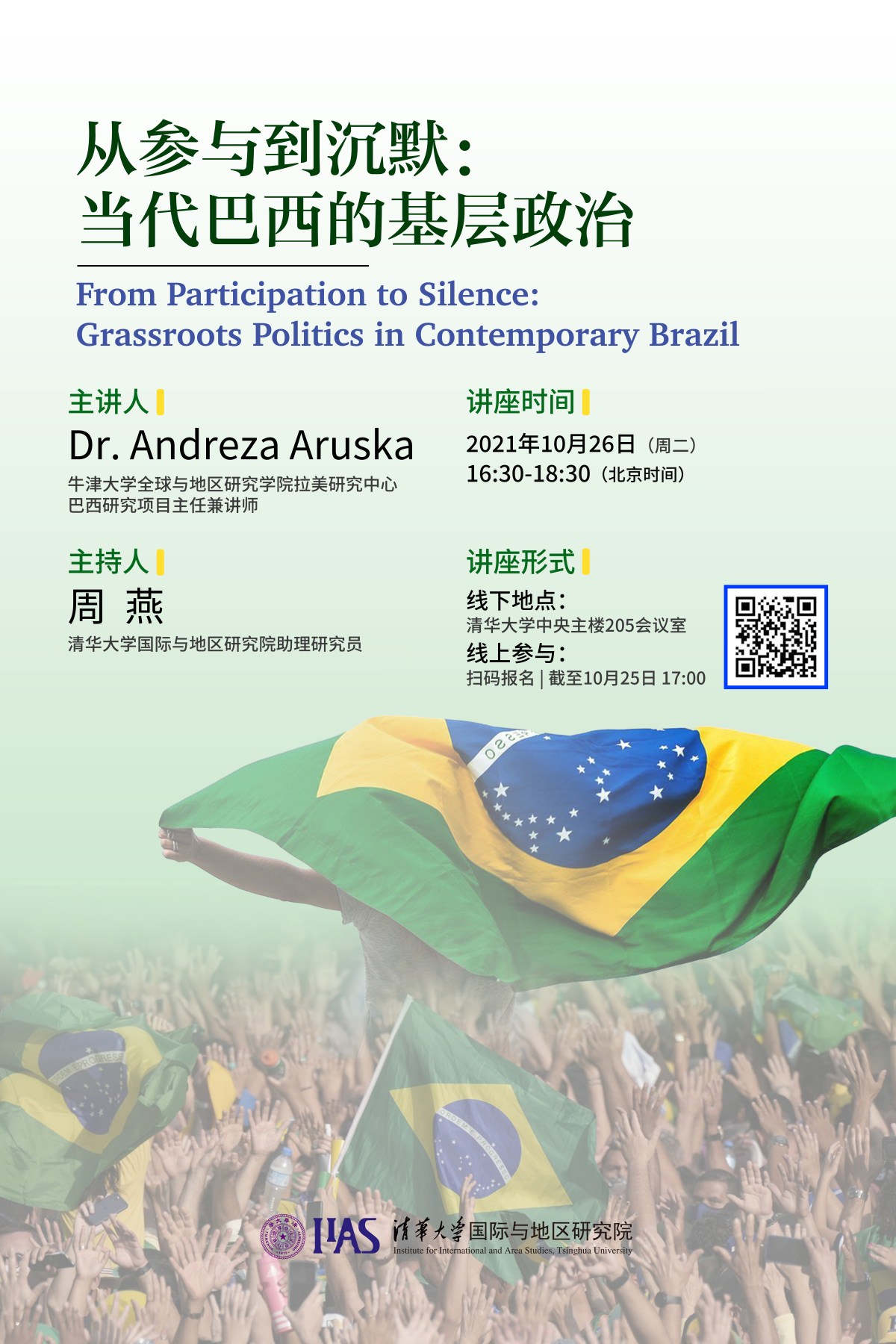

The first Latin American and Caribbean Research Lecture of the 2021 autumn semester hosted by the Institute for International and Area Studies of Tsinghua University was successfully held on October 26, 2021.The lecture is entiltled “From Participation to Silence: Grassroots Politics in Contemporary Brazil”. The speaker is Dr. Andreza Aruska, Director of the Brazilian Studies Programme at the Latin American Centre of University of Oxford. The lecture was presided over by Zhou Yan, assistant professor at the IIAS.
At the beginning of the lecture, Dr. Andreza introduced in detail the changes and characteristics of grass-roots politics in contemporary Brazil based on the anthropologist James Holston’s observation of emerging citizenship in the suburbs of Sao Paulo, Brazil. She believes that social movements in Brazil are often related to the demands of citizens. For example, social movements are triggered by the lack of living supporting facilities such as culture, education, sports and health in the urban fringe. Dr. Andreza deeply analyzed the complex causes behind the decline of grass-roots citizens’ political participation in contemporary Brazil. She believes that poverty is also a form of political oppression, which will undermine the mobilization and sustainability of social movements. If the poor can benefit from the results of social activities, they can also benefit from concealment and avoidance of confrontation. For citizens whose lives depend more on the basic public services of the state, the cost of directly confronting the state is very high. Take the labor law reform in Brazil in 2017 as an example. The far-reaching impact of this reform has made Brazilian labor relations more unstable, and the self-examination rate of citizens has gradually increased. Due to the cost of direct participation in politics, Brazilian grass-roots citizens prefer to hand over their political voice to professionals in the form of indirect confrontation.
During the interactive session, Dr. Andreza had a heated dialogue with online and offline listeners, some topics being in-depth exchanges on the role of black women in social movements, the relationship between labor law reform and productivity improvement, and the value of protests. The audience thanked Dr. Andreza for giving out such a wonderful and interesting lecture, and said they benefited a lot from it.
Dr. Andreza Aruska is the Director of the Brazilian Studies Programme at the Latin American Centre of University of Oxford, and completed her PhD in Social Anthropology at the University of St Andrews (UK). Her main research fields include grass-roots politics, informal economy, ethnography, social memory, inequality and social movements. She is the author of The Politics of Memory: Urban Cultural Heritage in Brazil、Governance Challenges in Latin American Cities、Trading Time and Space: Grassroots Negotiations in a Brazilian Mining District、Risky Closeness and Distance in Two Fieldwork Sites in Brazil, etc.
Text by: Xu Shuai
Typesetting by: Cheng Yao
Related Content
- Russian Economy and Eurasian Economy Lecture Series: Lecture 5 | Russia’s Economic Growth Model and Resource Dependence
- Russian Economy and Eurasian Economy Lecture Series: Lecture 4 | Russia’s Economic Strength and Social Development
- Russian Economy and Eurasian Economy Lecture Series: Lecture 3 | Russia’s Economic Transformation and Building of Modern Market Economy
- Russian Economy and Eurasian Economy Lecture Series: Lecture 2 | The Relevance of Historical and Cultural Factors to World Economic Analysis: A Case Study on the Economy of Russia and Ukraine Before and After the Conflict

